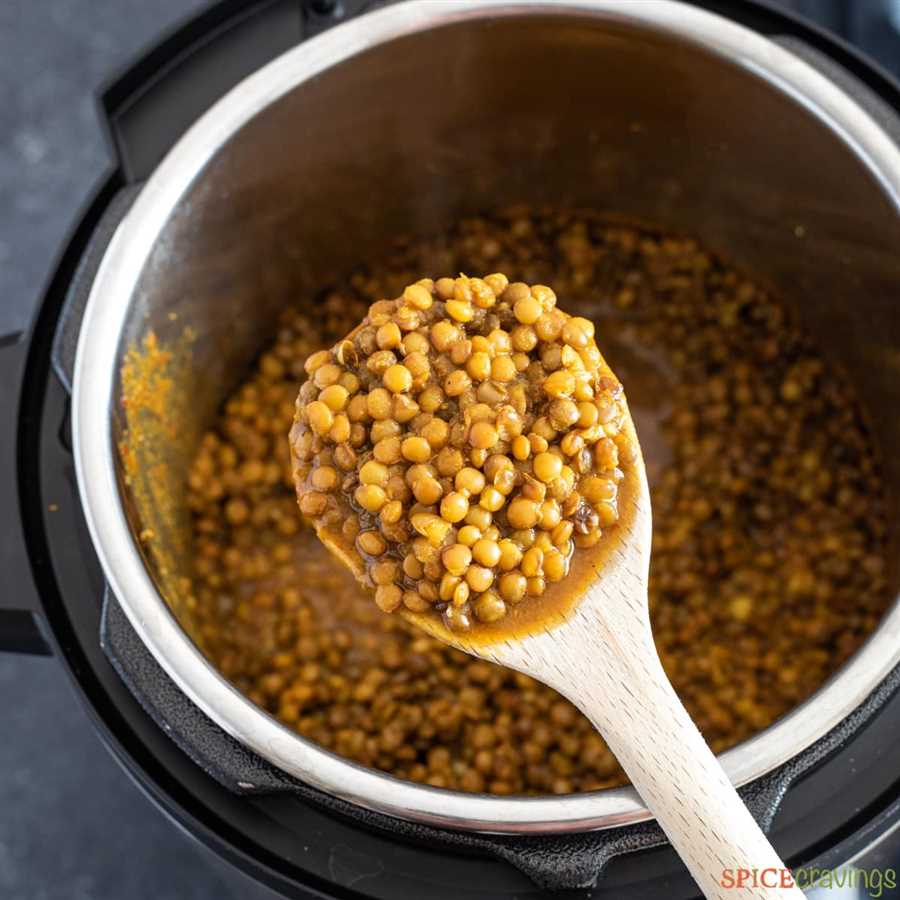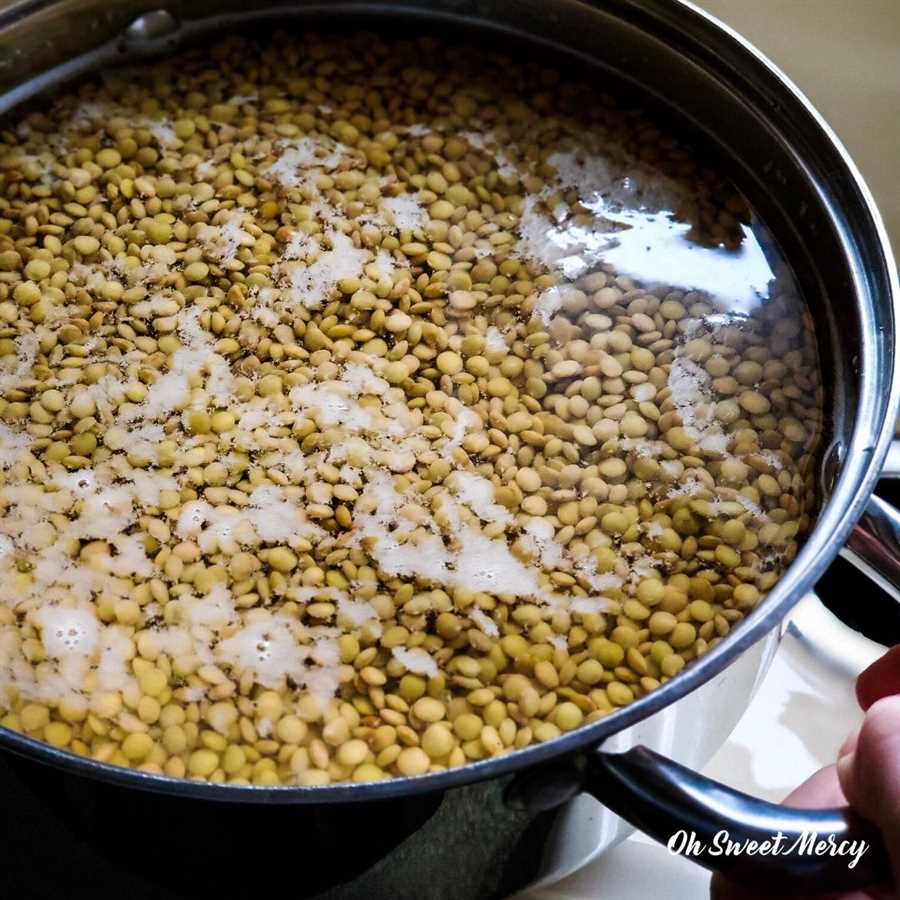







Lentils are a nutritious and versatile legume that are often used in a variety of dishes around the world. They are a great source of protein, fiber, and various essential nutrients. However, when it comes to preparing lentils for cooking, the question often arises: do you have to soak lentils before cooking?
The practice of soaking lentils before cooking is common in many cultures. Soaking helps to soften the lentils and reduces cooking time. Additionally, soaking can also help to remove any impurities or residues that may be present on the lentils.
Soaking lentils can also improve their digestibility and reduce the chances of experiencing bloating or gas after consumption. Lentils contain certain compounds that can be difficult to digest, and soaking can help break down these compounds and make them easier on the digestive system.
However, while soaking lentils is beneficial in many cases, it is not always necessary. Some lentils, such as red lentils, cook relatively quickly and do not require soaking. It also depends on personal preference – some people may prefer the texture of soaked lentils, while others may not notice a significant difference. Ultimately, whether or not to soak lentils before cooking is a matter of personal preference and convenience.
Benefits of Soaking Lentils Before Cooking
Soaking lentils before cooking offers several benefits that can enhance their nutritional value and digestibility. Here are some reasons why you should consider soaking lentils:
- Improved Digestion: Soaking lentils helps to break down complex proteins and carbohydrates, making them easier to digest. This can also help to reduce digestive discomfort such as bloating and gas.
- Reduced Cooking Time: Soaked lentils cook faster as soaking softens them, reducing the overall cooking time. This can be especially beneficial if you are short on time or prefer quick meal preparation.
- Increased Nutrient Absorption: Soaking lentils can increase the bioavailability and absorption of certain nutrients by reducing the presence of antinutrients such as phytic acid. This allows your body to better utilize the vitamins and minerals present in lentils.
- Enhanced Flavour: Soaking lentils can help to enhance their flavor and texture. Some people find that soaked lentils have a smoother and creamier consistency, which can be particularly desirable in dishes such as soups, stews, and curries.
Overall, soaking lentils before cooking can be a simple and effective way to improve their nutritional profile, digestion, and taste. While it is not always necessary, it is worth considering, especially if lentils tend to cause digestive issues for you or if you want to reduce cooking time.
Improved Digestibility
Soaking lentils before cooking can improve their digestibility. Lentils contain anti-nutrients like phytic acid and tannins, which can interfere with the absorption of minerals in the body. Soaking them helps to reduce the levels of these compounds and make the lentils easier to digest.
When you soak lentils, the water helps to break down some of the complex carbohydrates and proteins, making them more easily available for digestion. This can help to prevent digestive discomfort such as bloating and gas that some people experience when eating lentils.
Soaking lentils overnight or for several hours before cooking can also help to soften them, reducing the cooking time. This makes them more tender and palatable, while also preserving their nutrients.
If you prefer not to soak your lentils, you can still enjoy their nutritional benefits. Just be aware that they may be slightly harder to digest and may require a longer cooking time.
Reduction of Gas and Bloating
One common concern when it comes to eating lentils is the potential for gas and bloating. Lentils are rich in fiber and complex carbohydrates, which can be difficult for some people to digest easily.
One method to reduce gas and bloating is by soaking lentils before cooking them. Soaking lentils helps to soften the outer layer, making them easier to digest. It also helps to reduce the presence of compounds known as oligosaccharides, which are responsible for gas production during digestion.
To soak lentils, simply rinse them under cold water and place them in a bowl. Add enough water to cover the lentils by about one inch. Let them soak for at least one to two hours, or overnight for optimal results. Drain and rinse the lentils before cooking them as usual.
While soaking lentils can help reduce gas and bloating, there are other methods you can try as well. Adding spices like cumin, fennel, or ginger to your lentil dish can aid in digestion. Additionally, cooking lentils with bay leaves or kombu seaweed can also help reduce gas production.
Other Tips to Reduce Gas and Bloating
Aside from soaking lentils and using digestive-friendly spices, there are a few other tips you can follow to reduce gas and bloating when consuming lentils:
- Gradually increase your intake of lentils to allow your body to adjust
- Drink plenty of water to aid digestion
- Cook lentils thoroughly, as undercooked lentils can be harder to digest
- Chew lentils thoroughly to break them down more easily
- Avoid consuming lentils with other gas-producing foods like beans, cabbage, or onions
By following these tips and soaking your lentils before cooking, you can help reduce gas and bloating, making them easier on your digestive system. Experiment with different methods and find what works best for you!
Enhanced Nutrient Absorption
Soaking lentils before cooking can enhance the absorption of nutrients into the body. Lentils contain phytic acid, an anti-nutrient that can bind to minerals like iron and zinc, preventing their absorption. By soaking lentils, the phytic acid can be partially broken down, increasing the availability of these minerals.
Soaking also activates enzymes in lentils, which can help with digestion and nutrient absorption. Enzymes break down complex carbohydrates, proteins, and fats into smaller, more easily digestible forms. This can lead to improved nutrient absorption and overall digestive health.
Furthermore, soaking lentils can reduce the cooking time and make them easier to digest. By rehydrating the lentils, their cooking time can be reduced, which preserves more of their nutritional value. Soaking can also help to soften the lentils, making them easier to chew and digest, especially for those with digestive issues or sensitivities.
It is important to note that while soaking lentils can enhance nutrient absorption, it is not necessary for all types of lentils. Some lentils, such as red lentils, cook quickly and do not necessarily need to be soaked beforehand. However, for larger and tougher lentils, like green or brown lentils, soaking can greatly improve their nutrient value and digestibility.
- Soaking lentils can enhance the absorption of nutrients like iron and zinc.
- Soaking activates enzymes in lentils, aiding digestion and nutrient absorption.
- Soaking can reduce cooking time and make lentils easier to digest.
- Not all lentils require soaking, but larger and tougher lentils can benefit from it.
Shortened Cooking Time
If you choose not to soak lentils before cooking, you can still achieve a shortened cooking time by following a few tips:
- Rinse the lentils thoroughly before cooking to remove any dust or debris.
- Use a pressure cooker: Lentils cook much faster in a pressure cooker compared to regular stovetop cooking. This method can reduce the cooking time by about half.
- Add baking soda: Adding a small amount of baking soda to the cooking water can help soften the lentils and shorten the cooking time.
- Chop the lentils: If you prefer a quicker cooking time, you can chop the lentils into smaller pieces before cooking. This will help them cook faster.
- Simmer lentils with acidic ingredients: Acids like lemon juice, tomato sauce, or vinegar can help soften lentils and reduce the cooking time.
By following these tips, you can significantly reduce the cooking time for lentils without having to soak them beforehand. It’s important to note that while soaking lentils can help improve their digestibility and reduce cooking time, it is not always necessary, especially if you are short on time.
Enhanced Flavor and Texture

Soaking lentils before cooking can greatly enhance their flavor and texture. When you soak the lentils, they absorb water and become plumper. This hydration process helps to soften the lentils and makes them easier to cook.
Soaking also helps to remove any dirt or debris that may be present on the lentils. It helps to wash away any impurities and ensures that you are cooking with clean lentils.
An additional benefit of soaking lentils is that it can reduce the cooking time. When the lentils are soaked, they become more tender, allowing them to cook faster and more evenly.
Improved Taste

Soaking lentils can improve their taste by allowing them to absorb flavors from other ingredients in the dish. This can result in a more flavorful and delicious final dish.
Whether you are making lentil soup, lentil curry, or lentil salad, soaking the lentils can help to enhance the overall taste of the dish.
Enhanced Texture
Soaking lentils can also improve their texture. It helps to soften the lentils, making them less chewy and more tender.
When you cook soaked lentils, they have a smoother and creamier texture compared to lentils that have not been soaked. This can make the lentils more enjoyable to eat and can also improve the overall texture of the dish.
Therefore, if you want to achieve a better flavor and texture when cooking lentils, it is recommended to soak them before cooking.
Questions and answers
Do I need to soak lentils before cooking?
Yes, it is recommended to soak lentils before cooking them. Soaking helps to remove any dirt or debris and also reduces the cooking time.
How long should I soak lentils before cooking?
Ideally, you should soak lentils for at least 2-3 hours or overnight. This allows the lentils to soften and reduces the cooking time.
What happens if I don’t soak lentils before cooking?
If you don’t soak lentils before cooking, they will take longer to cook and may have a slightly tougher texture. Soaking helps to soften the lentils and also removes any impurities.
Can I skip the soaking process and cook lentils directly?
You can cook lentils without soaking, but it is generally recommended to soak them first. Soaking helps to improve digestion and reduce cooking time, resulting in softer lentils.
Can I use canned lentils instead of soaking and cooking dried lentils?
Yes, you can use canned lentils as a convenient alternative to soaking and cooking dried lentils. Canned lentils are already cooked, so they can be rinsed and used directly in recipes.
Should lentils be soaked before cooking?
No, lentils do not necessarily need to be soaked before cooking. While soaking can help reduce cooking time and make lentils easier to digest, it is not an essential step.







